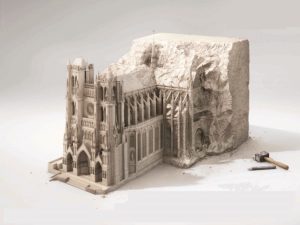The 2020 Broto Art-Climate-Science conference will take place virtually on Saturday, May 16, and Sunday, May 17. This year’s theme is “Time Sensitive: Exploring the Nexus of Art-Climate-Science & Deep Time.” Registration is free, although donations are encouraged, and the participation is limited to 500 people. While the conference usually takes place in Provincetown, the online format has already attracted attendees from 15 different countries. Broto also includes an online art show and prerecorded lectures followed by live question-and-answer sections.
Ian Edwards, director of Broto, told the Independent that he defines “deep time” as a “really, really long time — we’re talking tens of thousands or billions of years.” He says that we don’t always consider future generations when making decisions, but this type of thinking is urgently needed to address climate change. Edwards notes that art, like science, is not confined to time, and that such multidisciplinary collaborations bring in different perspectives.

“We came up with the concept for the conference before the pandemic, but it certainly does look like we are very timely,” Edwards says. “We did global-scale behavior changes overnight.” He has added a panel on the Covid-19 crisis and climate change.
Author Rick Antonson, whose talk is on Sunday at 2 p.m., said via email that he is honored to be part of the conference. His talk is on “cathedral thinking,” by which he means the mindset required to start projects that we may not see finished in our lifetimes. In the medieval era, architects were asked to design cathedrals that could take hundreds of years to complete. This sort of planning and dedication, while “difficult for most people who are preoccupied with the present,” Antonson says, is now needed to solve the climate crisis. And he adds that the topic also has special relevance to coronavirus.
“The ways that different countries and WHO [the World Health Organization] are coping with Covid-19 is proving most successful when they are building upon the foundation of work done by prior generations,” Antonson says. “In that way, too, what is being done in May 2020 will lay the foundation for countering future pandemics.”
Go to broto.eco to register for any of the panels and talks you are interested in:
SATURDAY, MAY 16
1 p.m.: “Deep Time & Climate”
Speakers: Nicholas Paul Brysiewicz from the Long Now Foundation, artist-philosopher Jonathon Keats, and oceanographer Hilairy Hartnett from Arizona State University. Topic: “How can thinking in terms of future millennia help us address climate change?”
2:30 p.m.: “Time as a Muse”
Speakers: Visual artist Elena Soterakis, sculptor Jonathan Latiano, and photographer Daniel Ranalli. Topic: “Deep time as an inspiration for art.”
4 p.m.: “Timefulness”
Speaker: Geologist Marcia Bjornerud. Topic: “How can thinking like a geologist inform climate science?”
6 p.m.: “Covid’s Eco-lesson in Behavior Change”
Speakers: Sustainability expert Peter ter Weeme, behavior scientist Amy Bucher, and artist Danielle Siembieda. Topic: “Takeaways from the Covid-19 crisis in relation to climate change.”
SUNDAY, MAY 17
2 p.m.: “Cathedral Thinking”
Speaker: Author Rick Antonson. Topic: “Starting projects that will not be completed in our lifetimes, and applications for addressing climate change.”
4 p.m.: “Selling Longtermism”
Speakers: Behavior scientist Amy Bucher, Julia Buntaine Hoel of SciArt Initiative, sustainability expert Peter ter Weeme, Étienne White of Sustainable Brands. Topic: “Why do people have trouble with long-term decision-making, and where do art and science stand in this equation?”
6 p.m.: “Broto 2020 Take-aways”
Julia Buntaine Hoel, Hilairy Hartnett, and Peter ter Weeme discuss highlights of the conference.



